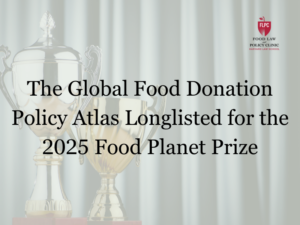By: Alex Leone (JD ‘16)
 Last weekend, something amazing happened at Harvard Law School. Hundreds of people—philosophers, policymakers, foodies, farmers, activists, anthropologists, nutritionists, naturopaths, and more—buzzed through the halls of Wasserstein for the Just Food? Conference. This two-day conference invited a diverse array of academics and practitioners to consider the human impacts of how our food is produced, distributed, and thrown away. The conference recognized that a conversation about food justice must consider public health, climate change, race relations, workers’ rights, animal welfare, and international trade, among other topics.
Last weekend, something amazing happened at Harvard Law School. Hundreds of people—philosophers, policymakers, foodies, farmers, activists, anthropologists, nutritionists, naturopaths, and more—buzzed through the halls of Wasserstein for the Just Food? Conference. This two-day conference invited a diverse array of academics and practitioners to consider the human impacts of how our food is produced, distributed, and thrown away. The conference recognized that a conversation about food justice must consider public health, climate change, race relations, workers’ rights, animal welfare, and international trade, among other topics.
Much of the trove of knowledge I hauled away from last weekend has brought me greater understanding of the costs of food, costs that are often not reflected in the numbers on price tags in the supermarket. For example, Pilar Egüez, a postdoctoral fellow from the University of Illinois at Urbana-Champaign, educated attendees on the costs of food gentrification: The developed world’s demand for exotic superfoods—like coconut and quinoa—often leaves the people in the communities from which these foods hail economically and nutritionally destitute.
Amidst a line of informative tables along the first-floor hall, Mily Trevino-Sauceda, President of Alianza Nacional de Campesinas, shared stories of the countless farm-working women who are victims of daily harassment and discrimination on the job, a job that too often does not pay even a living wage. Natasha Schvey, a postdoctoral fellow from the Uniformed Services University and National Institutes of Health, presented research on jurors’ perceptions of obese female defendants; alarmingly, merely looking heavier may more likely lead to a conviction by one’s peers.
And Natasha Bowens, author of The Color of Food, spoke of the struggles that have faced farmers of color in the United States, including discrimination in administration of grants and tough times that force sales of treasured lands to larger farmers. The attorneys of the Food Law and Policy Clinic also played a key role: Ona Balkus moderated a panel featuring Emily Broad Leib on Food Recovery as a Means to Food Justice, and Alli Condra moderated a panel on Visioning and Planning the Food System in New England and Massachusetts.

Ona Balkus, Harvard Food Law and Policy Clinic; Doug Rauch, The Daily Table; Sasha Purpura, Food for Free; Emily Broad Leib, Harvard Food Law and Policy Clinic
Some recent innovations have begun to make progress on these problems: The Fair Food Program, for example, converts an extra penny per pound of tomatoes into fairer pay for workers of Florida farm fields. And on Sunday, FLPC staff and others led participatory workshops challenging attendees to develop policy solutions to several of the problems presented at the conference. Finally, consumer awareness is—and will remain—essential. The Just Food? conference brought its attendees a great step forward on that front.
It also left us with a message of hope. A keynote by Frances Moore Lappé, cofounder of the Small Planet Institute, and Dr. Molly Anderson, Partridge Chair in Food and Sustainable Agriculture Systems at College of the Atlantic, revealed the remarkable success of Brazil’s Fome Zero (“Zero Hunger”) government program. And the conference itself—packed full of passionate people from all walks of life—was a testament to the fact that we will not stand idly by while our unavoidable need for food leads to the perpetuation and perpetration of injustice.
*Update July 13, 2015*
C-SPAN has coverage from the Just Food Conference here. Watch video from the conference here.






Health Law & Policy, Commentary
What services are most at risk in the Supreme Court case challenging the ACA preventive care rule?
January 30, 2025